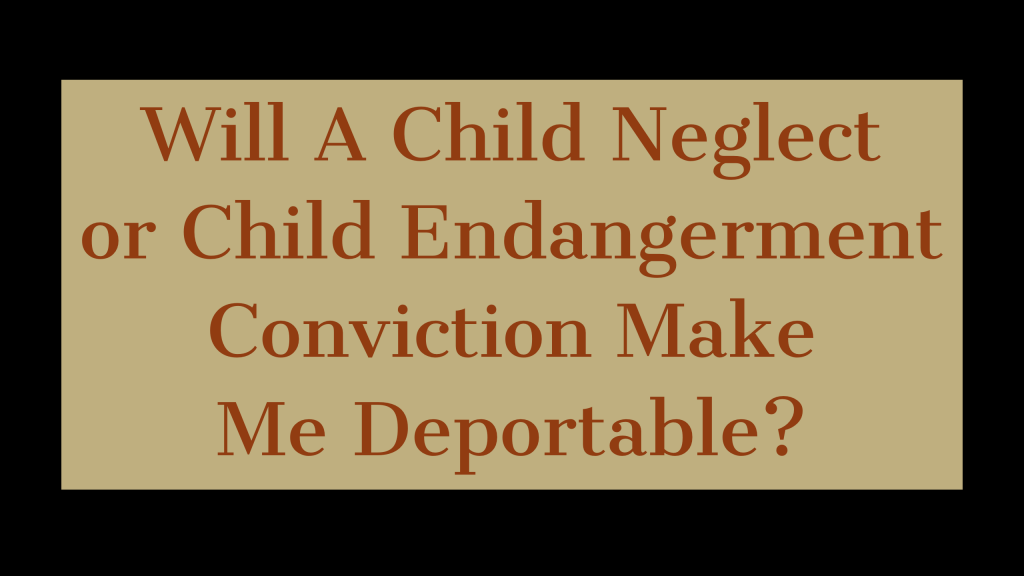
The Immigration and Nationality Act (INA) §237(a)(2)(E)(i) makes a non – U.S. citizen deportable if he or she is convicted of a crime of domestic violence, stalking, child abuse, child neglect, or child abandonment. Immigration attorneys often litigate whether a state conviction can be the basis for a federal deportation. The language in the state statute often must fit squarely within federal definitions to result in deportation based on a specific conviction. For example, the Board of Immigration Appeals (BIA) has determined that a conviction for “child endangerment” in Pennsylvania is not a conviction for “a crime of domestic violence, stalking, child abuse, child neglect, or child abandonment,” for purposes of INA §237(a)(2)(E)(i). In re Jose De Jesus Murillo Gutierrez, A207 105 449 (BIA May 12, 2017)
What is the Federal Immigration Law relating to child abuse?
Any person who is not a United States citizen and is convicted for a crime of child abuse is deportable. It doesn’t matter how long you have been in the United States or if this was a first offense or if you are a good person. The statute is clear. Now, you may have what is called a “form of relief,” available, but that is another issue. That is kind of like an affirmative defense. But a one time conviction for a child abuse offense can and usually will lead to the government issuing and filing a Notice to Appear, initiating deportation proceedings.
For a child endangerment conviction under state law to constitute a “conviction for a crime of child abuse,” it must contain, “a knowing mental state coupled with an act or acts creating a likelihood of harm to a child.” Matter of Mendoza Osorio, 26 I&N Dec. 703 (BIA 2016).
What is the Pennsylvania state law relating to child endangerment?
The Pennsylvania law relating to child abuse requires the state to prove that a parent or guardian “knowingly endangers the welfare of the child by violating a duty of care, protection, or support.” The State must prove that the parent or guardian failed to act properly in protecting the child’s physical or psychological welfare.
Why isn’t a conviction under Pennsylvania’s child endangerment statute considered a conviction for a crime of child abuse?
Unlike a New York child endangerment statute which was found by the BIA to be a “conviction for a crime of child abuse, this statute does not require the state to prove that the action by the parent or guardian is likely to injure the physical, mental or moral welfare of a child. Therefore, the key component of any states child endangerment statute is whether the statute requires the state to prove that there is a reasonable probability of harm to the child.
Is Pennsylvania’s child endangerment statute a crime involving moral turpitude?
Now that we’ve established that a conviction under Pennsylvania’s Child Endangerment statute does not qualify as a conviction for a crime of child abuse, let’s examine whether it qualifies separately as a crime involving moral turpitude, as a separate basis for deportation. The Third Circuit held that a conviction under this statute is not a crime involving moral turpitude.
What does that mean for someone convicted of child endangerment in Florida?
Florida’s child endangerment statute is called “Child Neglect,” and is defined in Fla. Stat. §827.03(1)(e) as, “[a] caregiver’s failure or omission to provide a child with the care, supervision, and services necessary to maintain the child’s physical and mental health, including, but not limited to, food, nutrition, clothing, shelter, supervision, medicine, and medical services that a prudent person would consider essential for the well-being of the child, or a caregiver’s failure to make a reasonable effort to protect a child from abuse, neglect or exploitation by another person.”
This is an extremely broad statute that covers a wide range of actions. The more aggravated the allegations, the more danger a conviction under this statute could be considered a deportable offense. For example, Child Neglect with great bodily harm could be considered a crime involving moral turpitude by the courts and could be considered an aggravated felony as a crime of violence if the sentence is 1 year or more. The fact is that there just isn’t a whole lot of case law related to the statute and its basis for deportation to give us firm guidance.
If you are not a United States citizen and you are charged with Child Neglect, Child Endangerment or Child Abuse in Florida, call an experienced immigration lawyer to discuss the possible immigration consequences and negotiation options that may be more immigration friendly.
 Jeremy Lasnetski is a partner at the Law Offices of Lasnetski Gihon Law. The firm focuses on criminal defense, immigration and personal injury. Mr. Lasnetski focuses his practice on immigration and criminal defense. Mr. Lasnetski is the former Jacksonville Regional Vice Chair of the American Immigration Lawyer’s Association, Central Florida Chapter and has represented clients in deportation proceedings, USCIS benefit cases, consular processing cases, and more. He routinely gives presentations on immigration law issues to both criminal and immigration lawyers at conferences and seminars throughout the State of Florida.
Jeremy Lasnetski is a partner at the Law Offices of Lasnetski Gihon Law. The firm focuses on criminal defense, immigration and personal injury. Mr. Lasnetski focuses his practice on immigration and criminal defense. Mr. Lasnetski is the former Jacksonville Regional Vice Chair of the American Immigration Lawyer’s Association, Central Florida Chapter and has represented clients in deportation proceedings, USCIS benefit cases, consular processing cases, and more. He routinely gives presentations on immigration law issues to both criminal and immigration lawyers at conferences and seminars throughout the State of Florida.
 Florida Immigration Lawyer Blog
Florida Immigration Lawyer Blog

